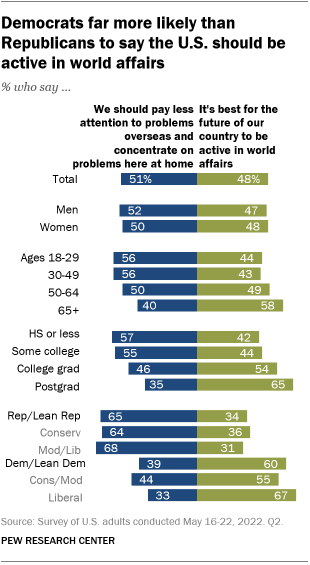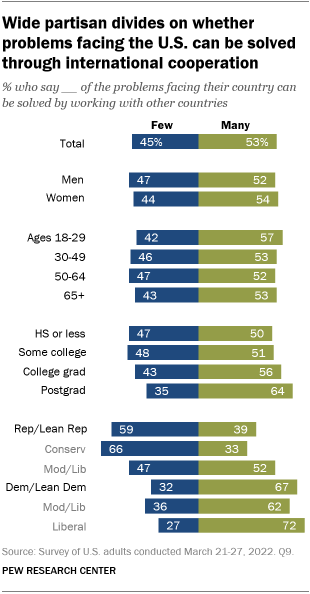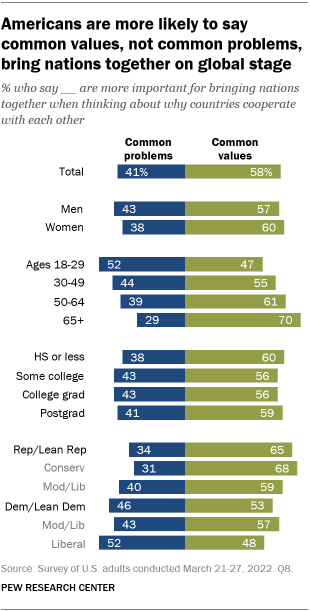

Americans are divided over the role the United States should play internationally, according to the results of two new Pew Research Center surveys. Around half of U.S. adults (51%) say the U.S. should pay less attention to problems overseas and concentrate on problems at home, while nearly as many (48%) say it’s best for the future of the country to be active in world affairs.
Views on this question have changed little over the past three years, despite the Russian invasion of Ukraine, the COVID-19 pandemic and the shifting list of global issues that Americans perceive as major threats to their country.
There are significant differences by age in Americans’ attitudes about whether the U.S. should focus more on domestic problems or be more internationally active. Majorities of adults under age 50 say the U.S. should concentrate on domestic problems, while those ages 50 to 64 are nearly evenly divided and around six-in-ten of those 65 and older (58%) say it’s better for the U.S. to be active in world affairs.
Pew Research Center conducted this study as part of a larger look at foreign policy attitudes among Americans. For this analysis, we surveyed 10,188 U.S. adults from May 16 to 22, 2022, and 3,581 U.S. adults from March 21 to 27, 2022. Everyone who took part in these surveys is a member of the Center’s American Trends Panel (ATP), an online survey panel that is recruited through national, random sampling of residential addresses. This way nearly all U.S. adults have a chance of selection. The survey is weighted to be representative of the U.S. adult population by gender, race, ethnicity, partisan affiliation, education and other categories. Read more about the ATP’s methodology.
The questions and responses used for this report can be found here (March survey) and here (May survey).
Americans with more education are more likely than those with less education to think the U.S. should be active overseas. Around two-thirds of those with a postgraduate degree (65%) say this, compared with just 42% of those with a high school diploma or less education.
Opinions also vary markedly by party. Democrats and independents who lean toward the Democratic Party are nearly twice as likely as Republicans and independents who lean toward the Republican Party (60% vs. 34%) to say it’s best for the future of the U.S. to be active in world affairs. Liberal Democrats are particularly likely to hold this view, relative to more moderate and conservative Democrats (67% vs. 55%).

Americans are similarly divided on a separate question about international engagement. Slightly more than half (53%) say many of the problems facing the U.S. can be solved by working with other countries, while 45% say only a few of the problems can be addressed this way. Views on this question, too, are nearly unchanged over recent years, despite tumultuous global events.
Americans with at least a bachelor’s degree are more likely than those with less than a college degree (60% vs. 50%) to say many issues can be solved through international cooperation.
Democrats and Democratic-leaning independents are much more likely than Republicans and GOP leaners (67% vs. 39%) to say many problems can be solved through international cooperation. Liberal Democrats are especially likely to hold this view, compared with conservative and moderate Democrats (72% vs. 62%). Among Republicans, those who describe themselves as moderate and liberal are more likely than conservatives (52% vs. 33%) to say that many of the problems facing the U.S. can be solved by working with other countries.

Americans are less divided on a different survey question about international cooperation. When asked what is more important for bringing nations together on the international stage – common problems or common values – nearly six-in-ten Americans (58%) point to common values.
Older Americans are particularly likely to say that common values unite countries on the international stage. Seven-in-ten of those ages 65 and older say this, compared with fewer than half (47%) of those under 30.
While more than half in each party say common values brings countries together, Republicans are more likely than Democrats (65% vs. 53%) to hold this view. Conservative Republicans are more likely than moderate and liberal Republicans to say common values bring cooperation (68% vs. 59%). Liberal Democrats, by comparison, are more likely than more moderate and conservative Democrats to say common problems – as opposed to common values – lead to nations working together.
Americans who believe that many problems can be solved through international collaboration are somewhat more likely than others to say that common problems – as opposed to common values – bring countries together on the international stage.
